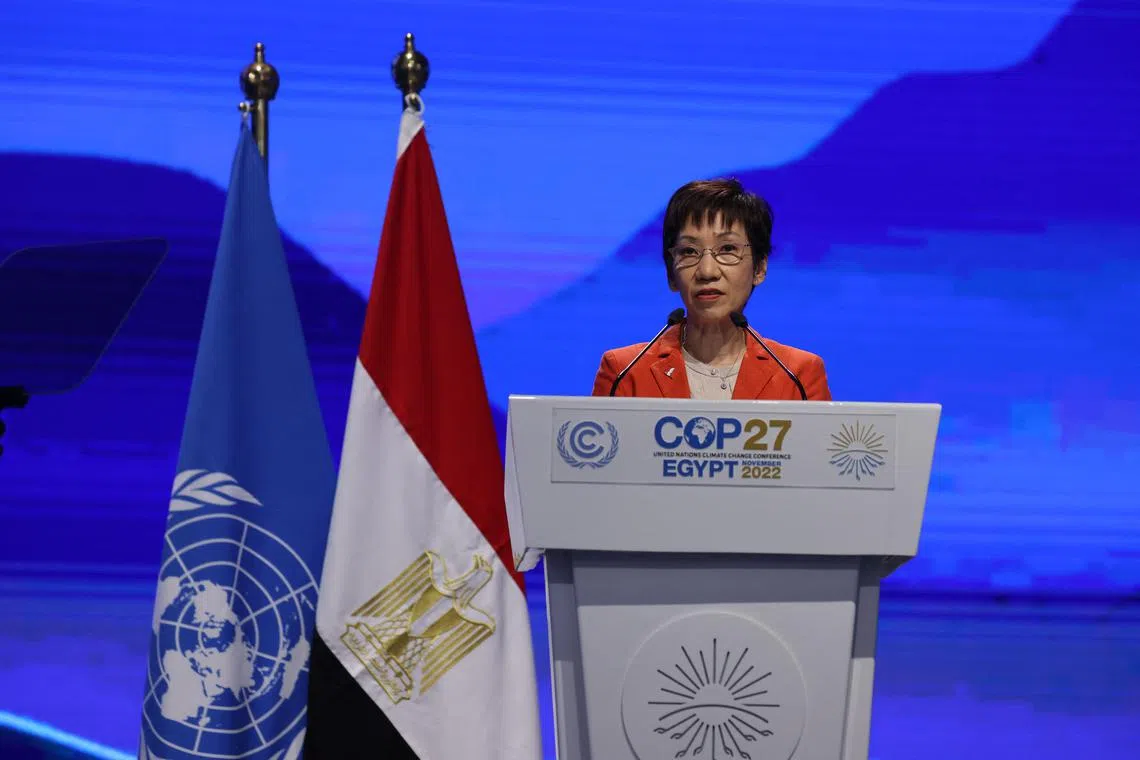Singapore to join partnership on implementation of carbon markets
Sign up now: Get ST's newsletters delivered to your inbox

Minister of Environment Grace Fu delivers a speech during the COP27 climate conference on Nov 15, 2022.
PHOTO: AFP
SHARM EL-SHEIKH, Egypt – To advance the implementation of carbon markets around the world, Singapore will join a partnership that will coordinate international capacity-building efforts to foster the trade of carbon credits.
Carbon markets, covered under Article 6 in the Paris Agreement, will enable countries and firms to trade carbon credits that could help them to decarbonise and cut emissions in a cost-effective way.
The Article 6 Implementation Partnership was launched by Japan’s Environment Ministry at its pavilion on the sidelines of the COP27 climate conference.
Singapore’s Minister for Sustainability and the Environment Grace Fu said: “This will enable high-integrity carbon markets to be set up and provide new pathways to achieve the goals of the Paris Agreement.”
The new programme, which 63 countries are currently part of, will also serve as an information platform for Article 6 to be implemented, and provide the support needed to pilot initiatives in the realm of carbon markets.
Ms Fu added that the progress made on carbon markets, along with increasing support for investments in low-carbon technologies worldwide, has given Singapore the confidence to raise its national climate ambition to achieve net-zero emissions by 2050.
Mr Simon Stiell, executive secretary of the United Nations Framework Convention on Climate Change (UNFCCC), said Article 6 is essential in accelerating emission reductions. He added that the UNFCCC will support countries by building capacity, and sharing knowledge and technical assistance, particularly for developing countries so they can fully benefit from carbon markets.
Two aspects of Article 6 are being discussed at COP27 this year, the first of which involves the bilateral trade of carbon credits between countries, or with private developers in another country.
The second aspect entails establishing a centralised marketplace of carbon credits that will be overseen by the UN.
While countries agreed on the broad rules during the COP26 conference in Glasgow in 2021, negotiators were left to fine-tune the details at COP27 this year.
Ms Fu will be co-facilitating the ministerial consultations on Article 6 for the second time with her Norwegian counterpart, Minister of Climate and the Environment Espen Barth Eide. Both countries will have to listen to the views of different parties on crunch issues under Article 6 and work collectively towards resolving them.
In 2021, the ministerial consultations on Article 6 co-facilitated by Ms Fu and Mr Barth Eide saw the establishment of the international carbon markets after six years of protracted negotiations.
Said Ms Fu: “To fully harness the potential of carbon markets, we need to lower the barriers of entry for countries to participate in carbon markets.
“One such barrier is the uneven levels of knowledge among countries. Hence, we need to build platforms that enable countries to exchange their experiences and knowledge in carbon markets.”
To that end, Singapore has been working on a number of capacity-building initiatives to enhance knowledge among countries on Article 6 in order to develop high-quality carbon credits.
Ms Fu added that Singapore, along with the World Bank and the International Emissions Trading Association, will be launching the Climate Action Data Trust in the coming weeks.
The trust is an independent global market infrastructure that aims to reduce the risk of double-counting and foster transparency and confidence in carbon markets.
Speaking at a fireside chat at the Singapore Pavilion on Tuesday, Ms Fu said there are a number of issues that would still have to be ironed out during the Article 6 negotiations.
One sticking point between negotiators involves the authorisation of carbon credits, she said.
Say, for example, one country authorises the sale of carbon credits to another country from its forest conservation project.
Negotiators have yet to decide if the host country can later withdraw its authorisation. This may happen if the host country determines at some point that it requires these carbon credits to meet its own emissions targets.



